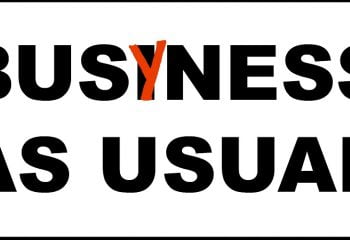Stay Persistent

"Yeah, you're gonna need to buy a new phone." The response I got from a Best Buy rep when I walked in the door and explained that my phone was having a hard time charging. "Really? A new phone just because it's not charging." I responded. "Well, why don't you talk to Mike; he's our mobile expert." Ten minutes after talking to Mike, my phone was fixed. Mike had the expertise and took the time to ask more questions rather than jump to an answer. It turns out the port (where the charge cord goes) had lint in it, and Mike was able to clean it out. What is impressive is how the first rep seemed to be so confident in their answer, and only when I pushed back did they refer me to the mobile expert. The key is to stay persistent. In sales and leadership don't stop after the first obstacle. Press on. And when you get an answer you don't want, ask to speak to someone else. Or ask more questions that will provide you a better solution. Too many times, we fall victim to bad advice and feel as though that is our only option, and yet when we stay persistent opportunities appear. ...
Does Conflict Impact Productivity?

Most times when we hear the word "conflict", we associate it with negativity. And most people in organizations try to avoid conflict at all costs. But there are two types of conflict. Healthy Conflict vs. Unhealthy Conflict And if you don't have healthy conflict you most assuredly have unhealthy conflict, and this can lead to lack of trust, collaboration, and ultimately it will affect productivity. Two common components of Healthy Conflict 1. Focus on the outcome, not on "being right." When lively discussions take place in a meeting, and people are debating on what project to do or how to solve a problem, everyone is focused on the "big picture" what is the best result. Opinions and suggestions are given freely. And you as the leader have created a safe space to share ideas and talk them through. Your team is more committed to the success of whatever you are deciding, rather than their success. Instead of jockeying for a position or making sure you come up with the right solution, the atmosphere is one where people are building on each other's comments and doing the har ...
Managing Promises, Not People

It is incredible how many good managers get consumed by firefighting or day-to-day activities that distract them from achieving their primary objectives. For many managers, the solution is to work harder and longer, picking up the slack from their team and delaying conversations around employee performance. In a poorly managed team an "Abdication of Accountability" environment develops where performing employees are punished with more work and less time and underperforming employees are rewarded with less work and more time. As a result, team performance, morale, and communication decline. So, how can you develop and lead a self-managing team? By managing promises. A self-managing team allows the manager to focus on what's most important: strategic planning, coaching, and growth. This program has its roots in my book, Three Values of Being an Effective Person.
Innate Busyness

"How are you doing?" "What are you doing?" Sound familiar? One of our first questions when seeing someone is usually about the behavior of "doing something." And constantly "doing something" or keeping ourselves busy is a habit that we probably acquired at a young age. As a child we may have been told, "find something to do" or "if you don't have something to do, I'll give you something to do" And this type of thinking has stayed with us. Busyness is an ingrained habit that keeps us from identifying and accomplishing what's most important in our lives. The habit of busyness in some people has evolved into a competition. Observing a conversation in a coffee shop a couple of years back, I was amazed at how two friends went back and forth sharing all they have been doing. It seemed like a competition of "who was doing more" rather than a connection of friends. Now we check our Facebook feed and at first find an escape from our daily responsibilities, but quickly feel a restlessness that we "should be doing something" but we either can't pull ourselves away or find an ...
Courage vs Conformity
What does courage look like at your work? Is it having a tough conversation with a boss, disciplining an employee for inappropriate behavior, or pushing back in a meeting? Anyone of these situations requires some amount of courage. Do they happen consistently? If we are honest, probably not. I'd be willing to bet that in your office there are still conversations waiting to happen on any one of these examples: a tough conversation with a boss, disciplining an employee for inappropriate behavior or pushing back in a meeting. I believe they don't happen because we conform. We are more concerned with the approval rating of others and blending in rather than taking action on what we know is right. There is some element of fear that prevents us from taking action. "Speaking from our hearts is what I think of as ordinary courage." Brene Brown I believe courageous people get scared, but they choose to ignore their feelings and take action anyway. Courage = Taking action even though you are scared. 3 Ways To Practice Courage 1: Say "No" more often Does this scenari ...
Structure of Accountability

"Your check-in time is 7:49," the receptionist told me as I arrived for an eight o'clock doctor visit. "Thank you", I responded. As I was on my way to sit down, I thought what a subtle way to inform people if they are on time for their appointment or not. We have become a society for being increasingly late. And excuses come out of our mouth like our usual cup of morning coffee. And we think rationalizing thoughts of, "they'll just figure it out and fit me in" or "I always wait for them." I came back a second time and was greeted with the same response. The reception told me about my check-in time. And then I thought this was more then just a way to let people know if they are on time, this is a structure of accountability. Structure of Accountability = something that is put in place to raise awareness of behavior I believe that when they started telling people about their check-in time, they saw an increase in more patients being on time. When the reception first told me about my check-in time at 7:49, I thought, I'm glad I'm on time. When I went back a second time, a ...
